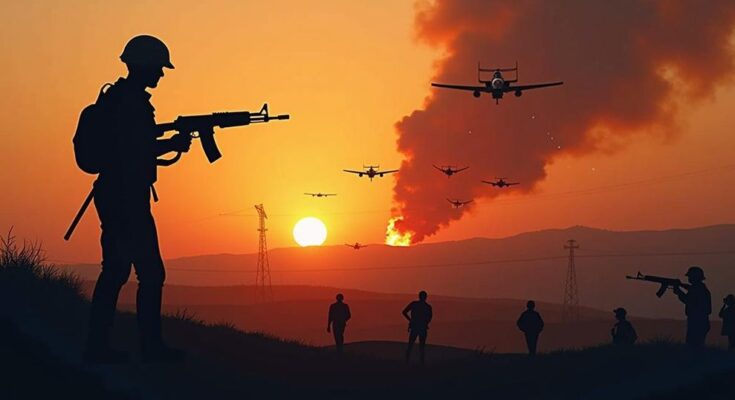The killing of Hezbollah leader Hassan Nasrallah by Israeli airstrikes in Beirut signifies a notable escalation in the conflict between Israel and the militant group. This situation heightens fears of a wider regional war as Israel contemplates a potential ground invasion of Lebanon amidst massive casualties and displacements resulting from ongoing bombardments. Both Hezbollah and Iran have vowed to respond to these provocations, raising the stakes for regional stability.
The recent days in the Middle East have witnessed an alarming escalation in hostilities following Israel’s elimination of Hezbollah leader Hassan Nasrallah through airstrikes on his Beirut stronghold. This incident marks a pivotal moment in the ongoing conflict between Israel and the Iran-affiliated Hezbollah, which has engaged in hostilities against Israel since the onset of the war in Gaza. Nasrallah’s death is particularly significant as it follows previous losses for Hezbollah, intensifying the group’s vulnerabilities. Israel has indicated that it is entering a “new era” of warfare, shifting its focus towards the northern front as it aims to reclaim tens of thousands of its displaced civilians. Concurrently, Lebanon has witnessed severe casualties and displacements due to Israeli bombardments that have devastated populated areas. Israeli Prime Minister Benjamin Netanyahu has dismissed a ceasefire proposal from the U.S. and France, showcasing the ongoing military strategy over diplomatic avenues. The repercussions of Nasrallah’s assassination are anticipated to prompt Hezbollah’s leadership to devise a new strategy for communication and retaliation. Experts suggest that although Hezbollah has sustained significant losses and operational setbacks, it retains formidable capabilities, including precision-guided and long-range missiles that pose a substantial threat to Israel. While Hezbollah has yet to orchestrate a major retaliatory strike in response to Nasrallah’s death, analysts believe that the likelihood of such an action has increased dramatically. Israel is also contemplating a potential ground invasion into Lebanon, marking what would be its fourth military operation in the region over the last fifty years. As Iran, a key ally of Hezbollah, has expressed solidarity following this event, the situation raises critical concerns about possible broader regional conflict and U.S. involvement should Iran feel compelled to intervene.
The Middle East is currently engulfed in escalating tensions primarily due to the ongoing conflict between Israel and Hezbollah, a militant group based in Lebanon. This conflict has intensified since the outbreak of the Israel-Hamas war in Gaza. The assassination of Hezbollah’s leader, Hassan Nasrallah, by Israeli airstrikes introduces a potential turning point, which could catalyze a broader military engagement involving Iran’s backing of Hezbollah. The volatility in the region is exacerbated by the strategic and tactical movements of both Israeli forces and their adversaries, instigating fears of a wider regional war. Displacement of civilians and casualties have surged as bombardments target locations suspected to harbor Hezbollah assets, complicating humanitarian conditions.
The assassination of Hassan Nasrallah represents a dramatic escalation in the conflict between Israel and Hezbollah, potentially setting the stage for broader military engagement in the region. As both sides prepare for potential further conflict, the implications of this development extend beyond immediate military confrontations, raising the specter of Iranian involvement and the broader geopolitical consequences. The precariousness of the situation indicates a critical need for diplomatic engagement to avert further escalation, though pathways to meaningful dialogue appear limited amidst ongoing hostilities.
Original Source: www.cnn.com




